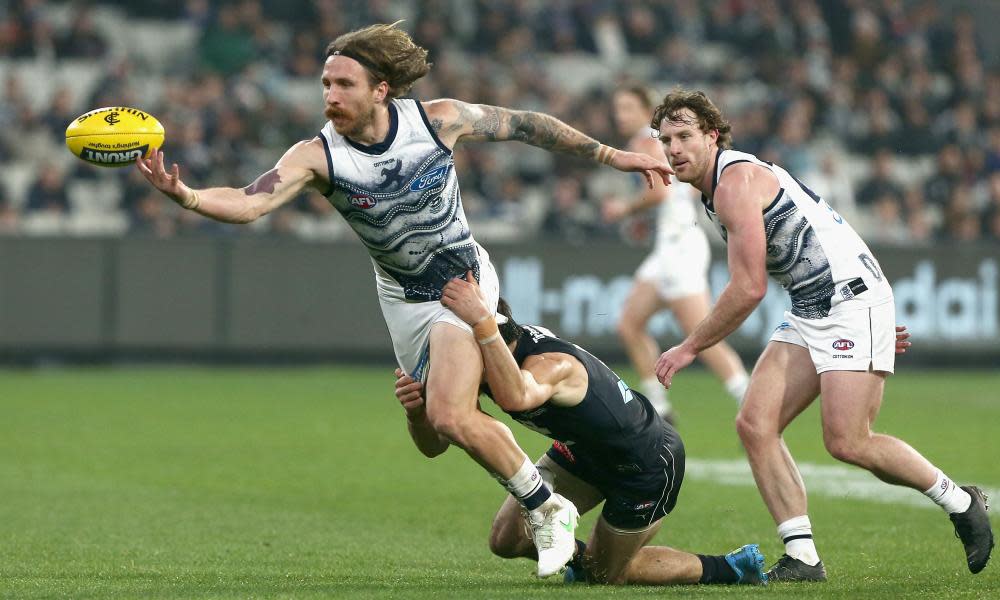From The Great Escape to Benny Hill: AFL on the run in madcap bid to see out season

The shortened AFL season of 2020 could have been set to the tune of The Great Escape. Teams spent months Steve McQueening over fences in the nick of time as one border opened while another closed, with each state shifting restrictions about who could enter, where they could go next, and what they could do in the interim.
In time Queensland emerged as the Switzerland of the picture, a distant vision to besieged communities of the rolling pastures of freedom. Back at AFL headquarters, trying to schedule 18 teams across five states to meet once apiece over those months must have been like one of those Chinese tile puzzles, each move threatening a cascade of potential problems even as it created openings in the tortuous march to completion.
By this year, though, any novelty to a schedule that changes by the day has shrivelled away like the sun-blasted leavings of lamb-marking season. In 2021, the Great Escape’s trumpets have morphed into the saxophones of Benny Hill. As virus situations mutate, squads and staff race across the country, bumping into one another, rushing in through one doorway just as another team leaves through the other.
In recent weeks the Lions flew from Brisbane to Melbourne before being turned around and sent home again. In a move that now sounds unfathomable, the Western Bulldogs fled a lockdown in Melbourne for the safety of Sydney en route to Perth. The Adelaide teams spent a day pinballing between homes and the airport as a trip to locked down Melbourne became a trip to Brisbane, then an all-Adelaide Showdown, before South Australia announced a lockdown that sent them to Melbourne after all. Then we have the increasing list of players knocked out of games by contact-traced exposure sites because they went cross-code to watch some rugby or chose the wrong time to visit their local cafe.
For the people performing this routine, it must by now have sunk plenty of them into lethargy. How often have you heard of a situation like last weekend, when a professional game had its start time delayed because one team was stuck in traffic? After a sudden switch of states, we were told that Richmond’s bus was hemmed in on the freeway to the Gold Coast. You could equally imagine Jack Riewoldt in his unexpected hotel room, one lamp tipped over on its side, texting the Brisbane Lions “No worries :) We’re on the way!!” when in fact he’d been sitting in a damp towel staring at the wall for 50 minutes.
This weekend, some things look normal: there will be hometown matches at the MCG, two Queensland teams playing each other in Brisbane, West Coast hosting a match in Perth, and Geelong being forced to play home games in Melbourne instead of Geelong. But there will also be two Adelaide teams hosting games at Melbourne’s Docklands, while Sydney teams form an unlikely grouping with Fremantle and Essendon on the Gold Coast. Increasingly, as instituted last year, the spiritual home of Australian rules football is now the other MCG – the Metricon Carrara Ground.
Which is well and good until next weekend, with four rounds of the season notionally to play, three red-zone states closed off to the rest of the country, and half the league’s teams on the wrong side of travel restrictions. Perhaps making sure that everyone played everyone in the first 17 rounds would have been the smart play for the AFL. Perhaps the tactic will be to gradually draw each team back to Victoria and bunker down to finish the season from there, with the hope that the promising local viral trajectory will hold.
Related: Eddie McGuire labels former club Collingwood an AFL ‘laughing stock’
But as we’ve all learned, any level of planning these days can be overturned. The New South Wales outbreak is frothing at the edge of the pot. Self-appointed representatives of Melbourne and Sydney bicker over who wore it better. After months of mangling the message about getting vaccines into people, federal authorities are just now realising that it would have been quite handy to have got vaccines into people. Now politicians are asking why they can’t shift a vaccine that works well but that they’re still formally advising people not to take. To co-opt the writer Scott Benson: “This is closing the barn door after the horse has bolted and then come back and sired several other horses that also left and came and there was a whole horse town and now there’s horses everywhere and they’re bad, bad horses.”
For those of us watching along, the show going on has been welcome. Football hasn’t saved Australia, but it has been reassuring over the past two winters to be able to hit the remote on a bleak night and find a game being played somewhere, by somebody. Whether it’s North Melbourne and Fremantle coming live from TIO Stadium in Darwin hasn’t much mattered. But when it comes to the performers in the show, the AFL should be thankful that the end of the season is in sight. This year’s comedy routine would really not be funny anymore.

 Yahoo Movies
Yahoo Movies 
